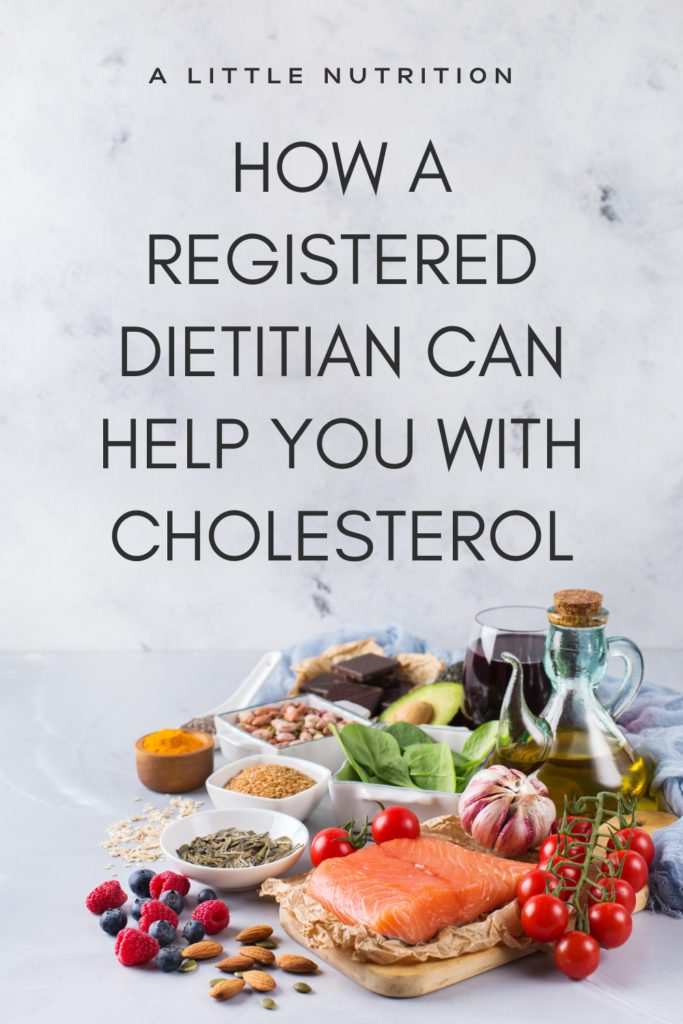Have you been told you have high cholesterol and are unsure of who to speak with to get more information about treatment options? Are you experiencing stress or worry related to your condition? Registered Dietitians can help walk you through the basics of your condition and provide the most current recommendations for nutritional management of high cholesterol. They can help you find ways to deal with the worry or stress you may be experiencing and help find lifestyle changes that work for you. Registered Dietitians can work hand-in-hand with your doctor or healthcare provider. They can help you put into place lifestyle changes to help manage your condition while providing you with ongoing support and education.
Important Facts About Your Condition
What is Cholesterol?
Cholesterol is a fat that is found in your blood. Cholesterol in your blood comes from two places: it is made in your liver and it comes from dietary intake (food). If left untreated, high cholesterol levels can lead to heart disease, heart attack and/or stroke.
Your healthcare provider may discuss the following types of cholesterol with you:
Low density lipoprotein (LDL) cholesterol – this is often referred to as the “bad cholesterol” because it can build up and stick to your artery walls which can block blood flow to your heart and/or brain. You should aim to keep your LDL cholesterol low – Low density lipoprotein → aim for low levels
High density lipoprotein (HDL) cholesterol – this is often referred to as the ‘good cholesterol’ because it may protect your body by removing the bad cholesterol. You should aim to keep your HDL cholesterol high – High-density lipoprotein → aim for high levels
Triglycerides – this is another type of fat found in your blood and is used as energy for your body. High triglycerides levels can be linked to other health conditions such as uncontrolled blood sugars (diabetes) or can be affected by certain medications.
Risk Factors for High Cholesterol
The only way of knowing if you have high cholesterol levels is to have your blood checked. There are many factors that may put you at risk for elevated cholesterol levels including:
- Family history of heart disease or high cholesterol levels
- Age – your risk increases as you get older
- Other pre-existing health conditions such as diabetes, high blood pressure or heart disease
- Smoking
- Having a pattern of eating that is high in saturated or trans fat
- Not moving your body enough throughout the day

How to Improve your Cholesterol Levels with Nutritional Changes
Most of the cholesterol in your body comes from your liver, but dietary sources can increase your levels as well. If you have a family history of high cholesterol, you may be at an increased risk. For individuals with high cholesterol, diabetes, or coronary heart disease, it is recommended to reduce the amount of dietary cholesterol you consume. Dietary cholesterol is found in animal products.
To help improve your cholesterol levels:
- Try lower-fat dairy products such as skim or 1% milk, low fat yogurt and cheese (less than 20% milk fat) or try adding some low fat milk alternatives (such as soy or rice-based products).
- Aim for 2 egg yolks per week – you can try some scrambled egg whites in place of whole eggs.
- Try using whole grains or high-fibre grains like whole-wheat bread, pasta, rice, barley in place of white grain products.
- Choose whole fruits instead of fruit juice and aim for 2-3 servings of fruit per day.
- Aim to have 2 servings per week of fatty fish (such as salmon, trout, sardines, mackerel, tuna, herring) – these are a good source of Omega-3.
- Choose plant protein more often such as tofu, legumes, beans, chickpeas, lentils, nuts, seeds, nut butters.
Here is a great recipe to try: The ultimate grillable plant-protein veggie burger

- Choose lean animal proteins such as poultry, turkey, fish (trim visible fat and remove skin).
- Try using margarine (preferably with added plant sterols such as Becel Proactive) instead of butter.
- Cook with healthy oils such as canola, olive, peanut, corn, cottonseed, flaxseed, grapeseed, safflower, soybean, sunflower.
- Try adding some sources of Omega-3 into your eating, such as chia seeds, walnuts, and flaxseed.
- Experiment with making homemade salad dressings instead of pre-made dressings:
- Use 1 part balsamic vinegar to 1 part olive oil then add any additional herbs, salt, or pepper.
Include more Heart Healthy Fats into your DaY
- Try adding avocado (or guacamole) to sandwiches and salads.
- Eat fatty fish twice per week (salmon, tuna, mackerel, herring, sardines).
- Try ¼ cup of nuts as a snack.
- Swap out butter or stick margarine for vegetable oil or soft margarine in baking and cooking.
- Add ground flaxseed or chia seeds to baked goods, oatmeal, smoothies, low fat yogurt, etc.
- Replace eggs in baking or other dishes with a flax egg mix:
- Use 1 tbsp flaxseed + 3 tbsp water for one egg
- Add nuts or seeds to salads, baking, yogurt or cereal.
- Replace tropical oils (coconut, palm, kernel) with other oils (canola, olive, flaxseed).
- For increased fiber and decreased saturated fat, try adding some plant-based meals such as:
- Black bean taco instead of beef taco
- Tofu stir-fry instead of chicken stir fry
- In ground meat dishes, replace half the ground meat with shredded carrots
- Lentil stew instead of beef stew

Using Fiber to Help Lower Cholesterol
There are two types of fiber in our diet: soluble and insoluble. Both types of fibre are important for our health, however, soluble fiber can help reduce LDL cholesterol levels. Soluble fiber can also help control blood sugar levels and help you feel full. It is important to add more fiber into your diet gradually and to increase your water intake as you increase your fiber intake. This will help reduce gas or abdominal discomfort. To help increase soluble fibre:
- Try having fruit as a snack during the day.
- Eat oatmeal, baked oatmeal or overnight oats for breakfast.
- Try adding some cooked beans to soups, salads, and/or casseroles.
- Use barley in soups.
- Mix cooked lentils with ground meat (beef, chicken or turkey) in recipes such as meat sauce or Shepherd’s Pie.
- Add cereals containing psyllium to your regular cereal or yogurt or have in place of other cereals.
- Add oats, oat bran or cereals containing psyllium to bread mixes, pancakes, muffins, or waffles.
- Talk to your Doctor or Registered Dietitian about adding a psyllium fiber supplement to your diet (Metamucil, Benefibre, etc.).

Managing your Diagnosis
If you have made some dietary changes to help improve your cholesterol levels, you should have your blood cholesterol levels checked again in 3-4 months. This will allow your healthcare provider to see if dietary and/or lifestyle changes are helping to improve your cholesterol levels. A registered dietitian can work with your doctor to recommend a treatment plan that works best for you. You may have to continue monitoring your blood cholesterol levels on a regular basis to make sure they stay within a healthy range. Your doctor may also recommend medications to help with the management of your cholesterol level
When Should you Consider Meeting with a Registered Dietitian?
If you feel ready to make lifestyle changes to help improve your cholesterol levels, it may be time to make an appointment with a registered dietitian. Nutrition can serve as an essential part of the treatment plan for someone diagnosed with high cholesterol levels. A Registered Dietitian can provide you with the education and support required to implement dietary changes and help improve your cholesterol levels.
What your Dietitian Can Do For You
During your initial appointment, you will receive an 80-90 minute session with a knowledgeable and compassionate Registered Dietitian that will help you feel supported and educated. Your Dietitian will:
- Clear up the confusion surrounding what, when and how much to eat to help you improve your cholesterol levels
- Assist you with actionable steps you can take for meal planning and incorporating more heart healthy foods into your daily eating
- Advocate and/or communicate with your Primary Healthcare Team (Doctor or specialist)
- Explain the basics of cholesterol (myth bust, health and nutrition guidelines, etc.)
- Help you manage emotions related to making the changes required to improve your health and quality of life
- Empower you to manage your health by understanding how to grocery shop, read nutrition labels, and prepare meals that you enjoy
- Provide you with cooking tips, meal prep guidance, recipe modifications, and snack ideas
Benefits of Working with a Dietitian at A Little Nutrition
A Little Nutrition is a safe place to receive non-judgemental health advice and guidance. Our Registered Dietitians provide a weight inclusive approach to care and will support you on your nutritional journey. Our Dietitians can help determine a nutritional plan that works best for your condition and will provide you with the support required to make healthy lifestyle changes.
Nutritional Services Overview
How many visits are recommended to see changes in my health?
Short answer: Most of our clients report seeing markable changes in their health after 3 to 5 appointments spaced out over 3 to 6 months.
Long answer: However, it really depends on the number of health and lifestyle concerns that need to be addressed. Additional skills and education around meal planning, meal preparation and grocery shopping may require extra time in order to implement and develop strong habits. In addition, there may be emotional underpinnings that are discovered during your meeting with the Registered Dietitian such as dieting trauma, emotional and stress eating, and poor body image and these may need to be worked through as well. We also have Counsellors and Therapists who can help you work through the everyday challenges of stress management, anxiety, depression, grief and relationship struggles. Psychotherapy is a tool that creates success when it is combined with health behaviour changes.
Are my appointments covered by Manitoba Health or Extended Medical Health Insurance?
Manitoba health does not cover private Dietitian services. However, if you have extended medical insurance through your employer, you may have coverage for Registered Dietitian and Therapist services. If you are uncertain about your coverage, you can call our office 1-204-515-7466 and we can look into it for you. In addition, if your plan allows for direct billing, we would be happy to directly bill your appointment and keep the out-of-pocket expense as low as possible.
How much do appointments cost?
- Initial appointments are 80-90 minutes in length and cost $190
- Follow-up appointments are 50-60 minutes in length and cost $135
How do I book an appointment with a Registered Dietitian?
To book an appointment with one of our Registered Dietitians or therapists you can:
- Phone: 204-515-7466
- Email: admin@alittlenutrition.com
- Book online: https://alittlenutrition.janeapp.com/
Pin Me For Later

References:
Heart and Stroke Foundation (2020). Assessed from: Managing cholesterol | Heart and Stroke Foundation
Healthwise (1995-2020). HealthLinkBC – High Triglycerides. Assessed from: High Triglycerides | HealthLink BC
Banish Boring Lunches -15 Power Bowl Recipes
Sign up and we will be deliver it right into your inbox!







